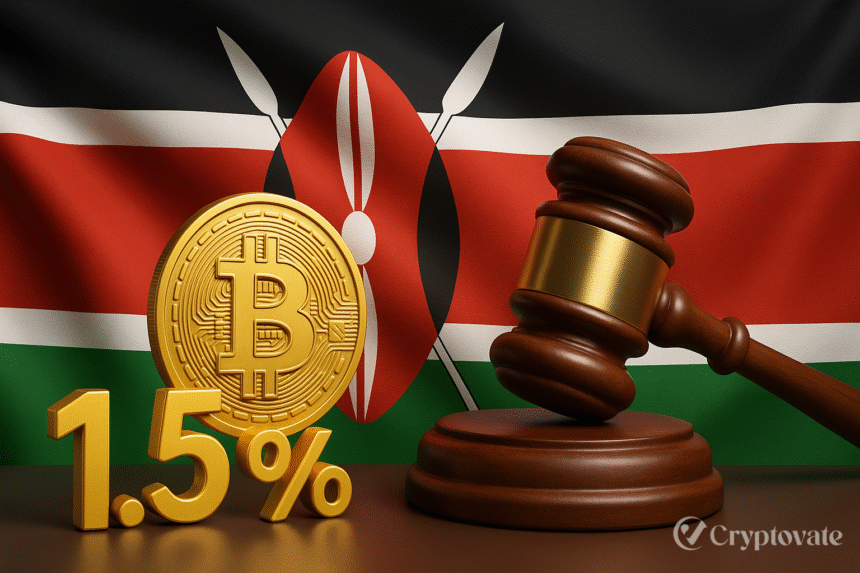– Ad –
| Getting your Trinity Audio player ready... |
Kenya, a powerhouse in Africa’s fintech revolution, has introduced a 1.5% Digital Asset Tax (DAT) on all cryptocurrency transactions, effective as part of the Finance Bill 2025. This bold policy applies to every crypto transfer and exchange, whether or not a profit is made, marking a significant step in regulating the rapidly growing digital asset space. As Kenya seeks to boost revenue while maintaining its position as a blockchain innovation leader, this tax may reshape the future of fintech throughout Africa.
A New Chapter for Kenya’s Fintech Leadership
Kenya has long been a trailblazer in financial technology, with innovations like M-Pesa transforming mobile payments. The 1.5% crypto tax, reduced from an earlier proposed 3%, reflects the government’s intent to harness the potential of digital currencies while funding public services. By taxing crypto transactions, Kenya aims to create a structured regulatory environment, encouraging legitimate blockchain businesses to thrive. This move aligns with the African Continental Free Trade Area’s (AfCFTA) vision of a unified digital market, positioning Kenya as a leader in shaping Africa’s digital economy.
Implications for Blockchain Innovation
The tax has sparked a lively debate among stakeholders. Supporters argue it provides clarity and legitimacy to the crypto sector, attracting institutional investors wary of unregulated markets. The revenue generated could fund infrastructure and digital literacy programs, further strengthening Kenya’s fintech ecosystem. Blockchain startups may benefit from a more predictable regulatory framework, fostering trust and encouraging innovation in decentralized finance (DeFi) and tokenization projects.
However, some industry players express concerns. The tax could increase transaction costs, potentially pushing smaller traders toward informal platforms, which may undermine financial inclusion. A coalition of Kenyan crypto firms, backed by PwC, has urged parliament to refine the policy to ensure it supports startups and aligns with global standards. Despite these challenges, the reduced 1.5% rate signals the government’s willingness to listen, offering a compromise that balances revenue goals with innovation.
Impact on Africa’s Digital Economy
Kenya’s crypto tax might pave the way for similar policies across Africa. As the AfCFTA works to unify 54 countries into one digital market, consistent regulatory frameworks become essential. Kenya’s proactive approach may inspire neighbors to adopt similar measures, creating a cohesive framework for blockchain adoption. This could accelerate cross-border crypto trade, boosting economic growth and financial access across the continent.
Yet, the tax’s success hinges on execution. Transparent implementation and stakeholder engagement will be key to maintaining Kenya’s competitive edge. If implemented effectively, the policy could strengthen Kenya’s position as a fintech leader, attracting investment and talent to Nairobi’s vibrant tech ecosystem.
Also Read: Javier Milei Cleared in Crypto Chaos: Argentina’s Anti-Corruption Office Closes $LIBRA Case
What’s Next for Kenya’s Crypto Landscape?
As parliament deliberates the Finance Bill 2025, the crypto community awaits clarity on implementation details. Will the tax spur innovation or create hurdles? Kenya’s ability to adapt its policies to global trends while nurturing its fintech ecosystem will determine the outcome. For now, the 1.5% tax is a bold step toward shaping a future where digital assets and financial innovation coexist.
FAQs
What is Kenya’s 1.5% crypto tax?
It’s a Digital Asset Tax (DAT) applied to all cryptocurrency transactions, including transfers and exchanges, regardless of profit, effective under the Finance Bill 2025.
How does the tax affect crypto users in Kenya?
The tax increases transaction costs, which may impact small traders but aims to regulate the crypto market and fund public services.
Will the tax harm Kenya’s fintech industry?
While some fear it may drive users to unregulated platforms, the reduced 1.5% rate and clear regulations could attract institutional investment and foster innovation.
How does this tax align with Africa’s digital goals?
It supports the AfCFTA’s vision of a unified digital market by creating a regulatory framework that could inspire similar policies across Africa.

















